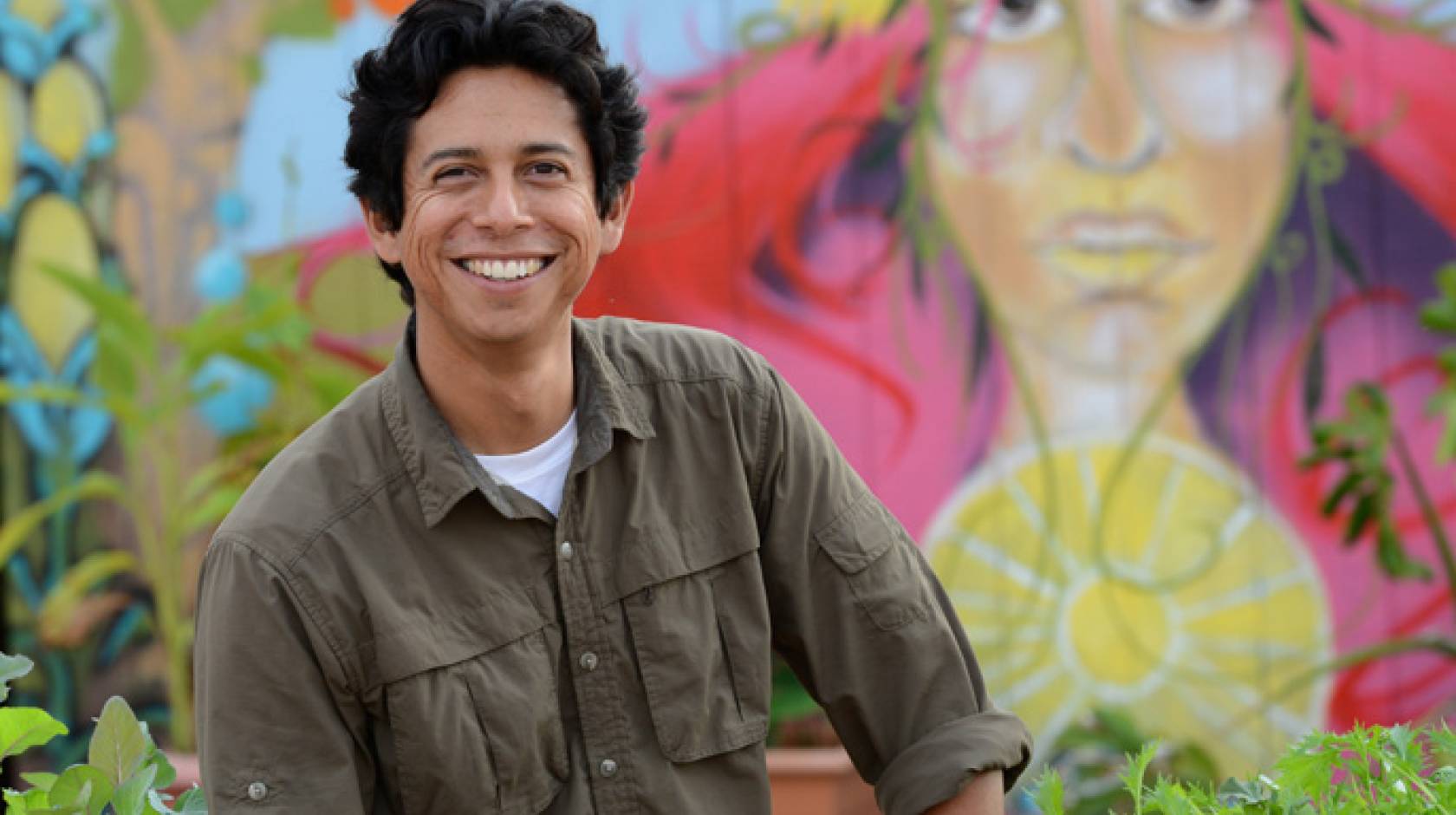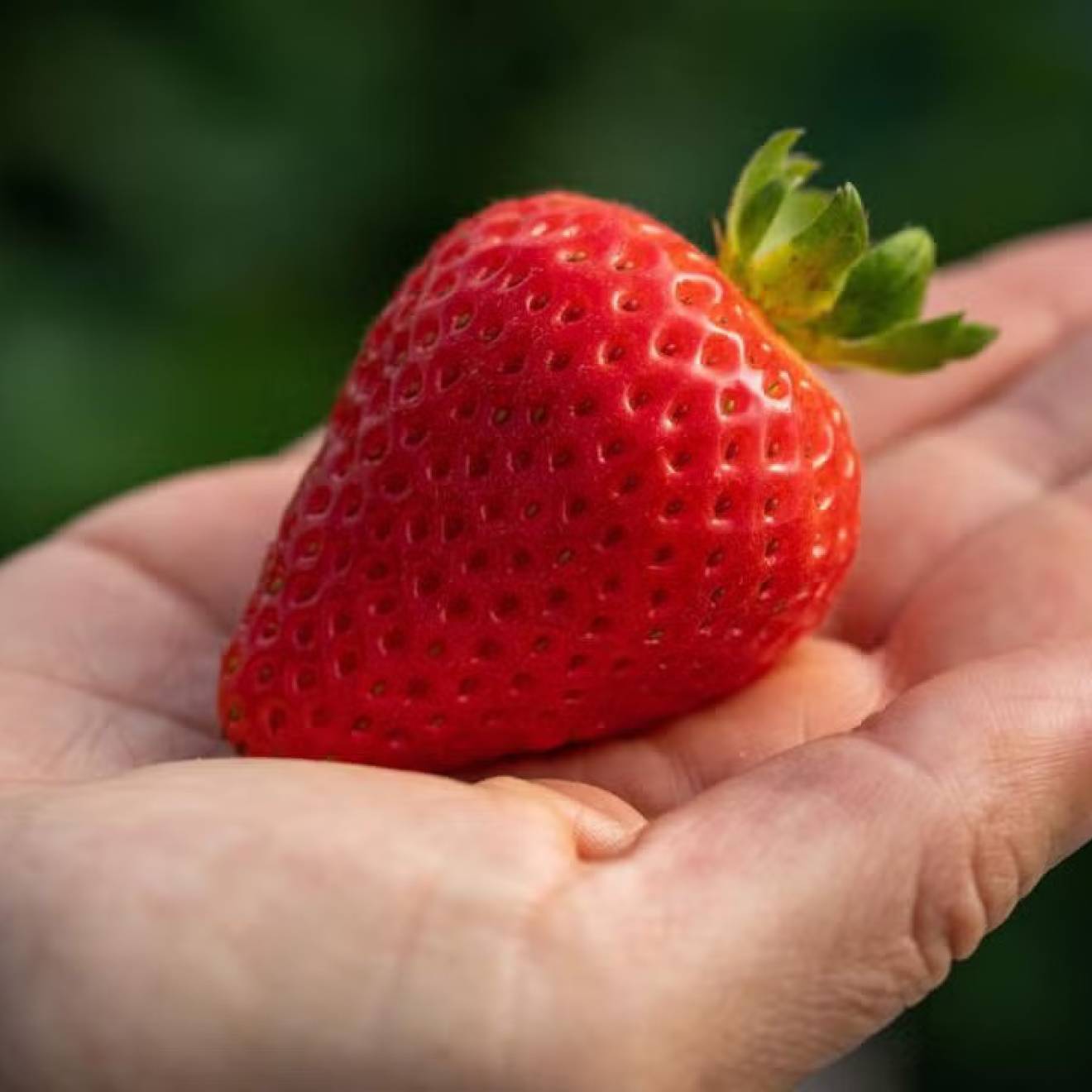Michelle Woo, UC Riverside

“So we’ve got strawberries right here,” says Fortino Morales III, gripping a garden hoe. “The irises are down. Kale. That’s red cabbage. Here, we’ve got cauliflower or broccoli — we’ll know pretty soon.”
Stepping past rows of green sprouts budding from a vast expanse of soil, Morales stops at a box of leek seedlings, which he and a group of interns are planting today. He lifts one out of its square compartment, examines it in the sunlight and uncurls the white roots with his fingers, bits of excess dirt falling to the ground.
“One of the reasons why I’m really drawn to the garden is because it’s tangible,” says Morales, who comes from a family of growers. “And at the end of the season, you’re able to feed others.”
A 2011 graduate of UCR, Morales is the coordinator of R’Garden, the campus’s 3-acre community garden where students, faculty, staff and community members can harvest fresh produce while learning about sustainable food systems — and cultivate broader solutions.
Here in this space, and across the university, a movement grows.
UCR is part of the University of California Global Food Initiative, a UC systemwide quest to address the myriad of food issues confronting the world, including food availability, security, sustainability and nutrition. The initiative, launched earlier this year by UC President Janet Napolitano and UC’s 10 chancellors, comes at a critical time. By the year 2025, the world’s population is expected to reach 8 billion. Yet already, 1 billion people suffer from chronic hunger or serious nutritional deficiencies. Roughly the same number of people are obese. UC, which has played a major role in helping California become the agricultural powerhouse of the nation, aims to be a leader in global food arena.
Riverside is a key engine in the initiative. Its roots in food and agricultural research run deep. Ever wonder why you can bite into a juicy citrus fruit virtually all year long instead of only during its natural winter season? Thank UCR scientists, who discovered chemicals that slow the aging of the fruit. Need rice that can survive a monsoon flood? No problem. They’ve helped make that a reality, too. What about weapons to protect California against the Asian citrus psyllid, a pest that could devastate the state’s citrus industry? Yep. UCR experts are fighting them. Could another potato famine be in our future? It’s possible, and UCR scientists are studying ways to address the threat.
On campus, students have participated in a wide array of courses, workshops and events focused on food education, from an Urban Garden seminar offered during the spring quarter to talks with local farmers to walking tours of the edible trees on campus, led by Tracy Kahn, curator of the UCR Citrus Variety Collection. As part of the initiative, UCR faculty and staff members are developing a UC systemwide lecture series called “Healthy Students, Healthy Campus, Healthy Communities.”
“UCR’s vision for the UC Global Food Initiative is to raise the profile of food issues as an integrated part of our daily lives starting locally, building globally,” says Peggy Mauk, director of Agricultural Operations and UCR’s initiative leader. “There is a renewed sense of energy on campus regarding food education and outreach. The initiative has been an excellent vehicle to bring together faculty, staff and students to address food issues.”
For the UCR community, it’s a movement they see, touch and even taste. This winter, fruits and vegetables from R’Garden will debut in the university’s residential restaurants and at the Barn. A hope is that when diners learn about where their produce comes from, they’ll develop a greater appreciation for the harvesting process and the nutritional benefits of plant-based foods.
“We’re grooming the people who can really make a difference,” says Cheryl Garner, executive director of dining services. “These are first-time shoppers, first-time cooks and future parents and leaders. With the rising cost of health care, clearly, we can’t just continue to think about health in the way we have in the past. We have to ask, how do we educate around it? How do we actually change people’s eating habits?”
Garner adds that many farmers are now retiring, so there’s an urgency to inspire and groom the next generation. “Campuses need to develop programs to get young people excited about farming, to teach them how to do it in a proper manner—or else we’re going to run out of food,” she says.
To help engage students in the Global Food Initiative efforts, the UC Office of the President created a fellowship program, funding three students on each campus to work on projects or internships related to the mission. At UCR, Daniel Lopez, Dietlinde Heilmayr and Darrin Lin received the award, which comes with an honorarium of up to $2,500. Lopez, a third-year undergraduate with a double-major in linguistics and anthropology, is investigating why 22 percent of UCR students self-reported that they skip meals often or very often, according to the 2012 University Experience Survey (UCUES). He hopes to curb the statistic and eventually open an on-campus pantry, a place where students can pick up food for the day, week and even the quarter. Heilmayr, a second-year graduate student in the School of Psychology, is studying the potential of gardening as a “multifaceted intervention,” a way to slowly shift people onto a healthy trajectory. And Lin, a senior undergraduate majoring in computer engineering, aims to showcase UC Global Food Initiative efforts by developing a new website.
UCR is also launching CAFE — the California Agriculture and Food Enterprise. Led by professor of genetics Norm Ellstrand, it is an institute that will act as an umbrella for UCR interdisciplinary research and other activities associated with food and agriculture in the broadest sense. “The membership is so diverse,” Ellstrand says. “We have researchers studying everything from the psychology of gardening to the interaction of diet and health to crop improvement during environmental challenges.”
Through the efforts at UCR and across the university system, the UC Global Food Initiative hopes to put the world on the path to sustainably and nutritiously feeding itself.
It all starts by planting the seeds.

